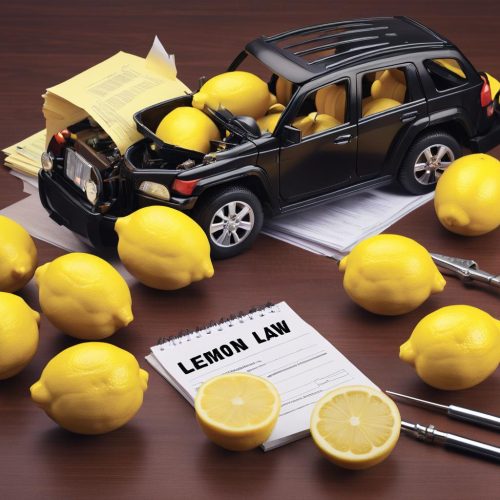Understanding the CA Lemon Law Presumption
July 29, 2024
The California Lemon Law, formally known as the Song-Beverly Consumer Warranty Act, is designed to protect consumers who purchase or lease defective vehicles. The Lemon Law presumption is a key element of this legislation, offering significant protection for consumers.
What is the Lemon Law Presumption?
The Lemon Law presumption means that a vehicle is presumed to be a lemon if it meets certain criteria within a specific time frame. This presumption places the burden of proof on the manufacturer, making it easier for consumers to obtain relief.
Criteria for Lemon Law Presumption
- Reasonable Number of Repair Attempts: The vehicle must have undergone a reasonable number of repair attempts for the same issue. Generally, this means:
- At least two attempts to repair a safety-related defect.
- At least four attempts to repair a non-safety-related defect.
- The vehicle has been out of service for repair for more than 30 cumulative days.
- Time Frame: The issues must occur within the first 18 months of delivery or the first 18,000 miles, whichever comes first.
Understanding these criteria is crucial for consumers who believe their vehicle may be a lemon. Knowing your rights and the legal presumption can significantly enhance your chances of a successful claim.
Understanding Lemon Law Requirements
Understanding the Lemon Law requirements is essential for any consumer dealing with a defective vehicle. These requirements determine whether a vehicle qualifies as a lemon and what steps need to be taken to seek relief.
Key Requirements for Lemon Law Claims
- Warranty Coverage: The vehicle must be covered by the manufacturer’s warranty when the defect is first reported. This includes both express and implied warranties.
- Substantial Defects: The defects must substantially impair the vehicle’s use, value, or safety. Minor issues or cosmetic defects typically do not qualify.
- Repair Attempts: The manufacturer must be given a reasonable number of attempts to repair the defect. As previously mentioned, this generally means two to four attempts, depending on the nature of the defect.
- Notification: Consumers must notify the manufacturer of the defect and allow them to repair it. This often involves taking the vehicle to an authorized dealership for repairs.
Documentation is Key
Keeping detailed records of all repair attempts, including dates, descriptions of the issues, and repair orders, is crucial. This documentation serves as evidence to support your claim.
Seeking Legal Assistance
Given the complexities of Lemon Law claims, consulting with a Lemon Law attorney can be beneficial. An experienced attorney can guide you through the process, ensure all requirements are met, and help you achieve a favorable outcome.
Common Myths About Lemon Law Requirements Debunked

There are several misconceptions about Lemon Law requirements that can prevent consumers from seeking the relief they deserve. Let’s debunk some of the most common myths.
Myth 1: Only New Cars Qualify Under Lemon Law
- Fact: While Lemon Laws primarily apply to new vehicles, some states, including California, offer protections for used vehicles as well, provided they are still under warranty.
Myth 2: Any Defect Makes a Vehicle a Lemon
- Fact: Not all defects qualify a vehicle as a lemon. The defects must substantially impair the vehicle’s use, value, or safety.
Myth 3: You Must Use the Manufacturer’s Dealership for Repairs
- Fact: While it is often recommended to use an authorized dealership for repairs, some states allow repairs to be performed by any certified mechanic, as long as the defect and repair attempts are well-documented.
Myth 4: You Can Only File a Claim Within the First Year
- Fact: The timeframe for filing a Lemon Law claim varies by state. In California, the presumption applies within the first 18 months or 18,000 miles, but claims can sometimes be filed beyond this period if the vehicle remains under warranty.
Myth 5: Lemon Law Claims are Always Time-Consuming and Costly
- Fact: While some Lemon Law claims can be complex, many are resolved relatively quickly, especially with the assistance of an experienced attorney. Additionally, many states require manufacturers to cover the legal fees of successful claimants.
How the Lemon Law Process Works

Navigating the Lemon Law process can seem daunting, but understanding each step can help you confidently pursue a claim.
Step 1: Identify the Defect
- Recognize that the defect must substantially impair the vehicle’s use, value, or safety. Keep track of any recurring issues and how they affect your vehicle.
Step 2: Attempt Repairs
- Take your vehicle to the manufacturer’s authorized dealership for repairs. Ensure all repair attempts are documented, including dates and descriptions of the issues.
Step 3: Notify the Manufacturer
- If the defect persists after a reasonable number of repair attempts, notify the manufacturer in writing. This notification should include details of the defect, repair attempts, and your intent to file a Lemon Law claim.
Step 4: Seek Resolution
- The manufacturer may offer a replacement vehicle or a refund. If an agreement is reached, ensure all terms are documented.
Step 5: File a Claim
- If the manufacturer does not provide a satisfactory resolution, file a Lemon Law claim. This often involves submitting a formal complaint to the relevant state agency or court.
Step 6: Mediation or Arbitration
- Many states offer mediation or arbitration programs to resolve Lemon Law disputes. These processes are typically faster and less formal than court proceedings.
Step 7: Legal Action
- If mediation or arbitration does not result in a satisfactory resolution, you may need to pursue legal action. An experienced Lemon Law attorney can represent your interests and help you achieve a favorable outcome.
Understanding the CA Lemon Law presumption, Lemon Law requirements, common myths, and the overall process can empower consumers to take action when dealing with defective vehicles. By staying informed and seeking appropriate legal assistance, you can navigate the Lemon Law process effectively and protect your rights as a consumer.
